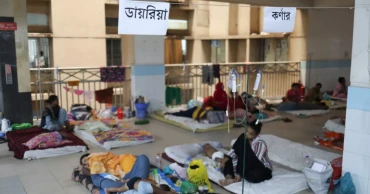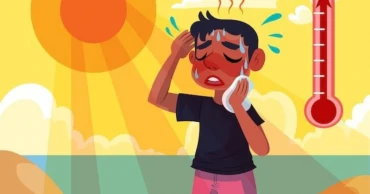Heat-related Illness
Overwhelming heat exacerbates health challenges across Dhaka, as children bear the brunt of the impact
A prolonged heatwave has significantly increased patient admissions in hospitals throughout Dhaka, with the city's medical facilities struggling to cope with the additional burden.
Most admissions involve heatstroke, fever, cold, diarrhoea, and pneumonia, ailments that disproportionately affect children.
Patients and their families face severe heat within hospital premises as well, worsening conditions for those already suffering. Many hospitals, including Dhaka Medical College Hospital (DMCH), have reported a surge in cases since Eid, with no space left even on the floors, forcing many to resort to makeshift solutions like hand fans or small table fans.
Abul Malek, from Dhaka’s Nodda area, was admitted at DMCH. His son Nadim told UNB, "The heat is unbearable, and the lack of available beds has left my father to receive treatment on the floor. The situation would have been somewhat manageable with lower temperatures."
Severe heatwave in Khulna: Day labourers forced to work in dangerous conditions
In response to the dire situation, Brigadier General Md. Asaduzzaman, Director of Dhaka Medical College Hospital, emphasized their efforts to improve conditions. "We're swapping out all malfunctioning fans and adding new ones wherever possible. Additionally, technicians have been instructed to ensure separate lines for fans and lights to prevent electrical issues."
Patient admissions have reportedly doubled at Kurmitola General Hospital, Mugda Medical College and Hospital and Dhaka Shishu Hospital as well since Eid. The majority of these patients are suffering from diarrhoea and pneumonia. The emergency and outpatient medicine departments are under the most pressure, facing the highest patient load.
Professor Dr. Farid Ahmed, Head of General Pediatrics at Dhaka Shishu Hospital, highlighted the impact of the heatwave on young patients: "With the heat continuing, children are particularly vulnerable to heatstroke and other diseases, which have led to an alarming rate of hospital admissions. We are struggling to provide enough beds."
Public health expert and former director of Disease Control at Directorate General of Health Services, Professor Dr. Be-Nazir Ahmed, stressed the severity of the situation, noting, "The current heatwave is unbearable. It not only raises the risk of cholera but also heightens the likelihood of other diseases. Extreme temperatures disrupt normal bodily functions, posing life-threatening risks and increasing susceptibility to various infections."
Fear of fruit failure grips mango growers in Chapainawabganj as heatwave Intensifies
The authorities have urged the public to stay indoors unless absolutely necessary and avoid direct exposure to extreme temperatures. With schools reopening, there is an increased concern for children's safety, necessitating heightened awareness and preventive measures against foodborne diseases and dehydration.
This crisis underscores the pressing need for improved infrastructure and preparedness to handle climate-induced health emergencies, particularly for the most vulnerable populations such as children.
1 year ago
Summer Tips for School-going Children
As the summer heatwave continues, the risk of heat exhaustion and dehydration becomes a concern. Like adults, children can suffer from severe heat-related illnesses. Therefore, parents and caregivers should be cautious, especially for school-going children who stay outside the home for hours. Here are some essential summer tips to ensure the well-being of school-going children during the hot months.
How to Keep School-going Children Healthy During Summer Heat Waves
Stay Hydrated
Ensuring children stay hydrated is crucial during a heatwave. Parents and caregivers should encourage children to drink plenty of fluids throughout the day, focusing on water as the primary source of hydration. It would be wise to avoid serving children sugary or caffeinated beverages that can contribute to dehydration.
While leaving for school, it is necessary to provide children water bottles and remind them to take regular sips, even if they are not feeling thirsty. Offer water-rich fruits and vegetables like watermelon, cucumber, and oranges as healthy snacks to help keep children hydrated.
Read more: How to Protect Outdoor Workers from Heat Stroke
Dress Appropriately
Lightweight, loose-fitting clothing of breathable fabrics like cotton or linen can help children stay cool. It is highly recommended to opt for light-coloured clothes that reflect sunlight rather than dark colours that absorb heat.
Furthermore, while staying outdoors children can wear wide-brimmed hats and sunglasses to protect their faces and eyes from the sun's harmful rays.
Seek Shade
Children might need to stay outdoors for diverse purposes, like waiting for a school bus. During such situations, children should be encouraged to seek shade or canopies to minimise direct exposure to the sun.
Read more: How to Protect Your Skin and Hair from Sun Damage
Apply Sunscreen Liberally
Sunscreen application is another crucial aspect of sun protection. Like adults, children can use broad-spectrum sunscreen with a high SPF (Sun Protection Factor) of at least 30. Before going to school or other places, kids need to apply sunscreens generously to their exposed skin, including the face, neck, arms, and legs. Nowadays many reputed brands produce child-friendly sunscreen products.
Sunscreen should be reapplied every two hours, or more frequently if children are swimming or sweating heavily. Parents and caregivers should teach children how to apply sunscreen properly and encourage them to build their sun protection routine.
Plan Outdoor Activities Wisely
While planning schedules for active outdoor games and sports during the warmer months, parents should pay attention to the matter that children stay safe from overheating or sunburn. However, when planning outdoor activities, it's essential to schedule them during the cooler parts of the day, such as early morning or late afternoon, to avoid the peak heat hours.
Read more: Summer Drinks: Refreshing Homemade Sherbets to Beat the Heat
Caregivers should guide children to play in shaded areas, such as parks with plenty of trees, or bring portable shade structures like pop-up tents or sun umbrellas to prevent sunburn and heat-related illnesses.
While playing, sweat should be wiped off immediately. Additionally, encouraging regular play breaks in shaded areas allows children to rest and hydrate. It is essential to prevent heat-related illnesses.
Stay Indoors During Peak Heat
During extreme heat, it is best to stay indoors in air-conditioned or well-ventilated spaces for children to avoid heat-related illnesses. It would be thoughtful for the parents and caregivers to plan indoor activities like board games, arts and crafts, or movie marathons to keep children entertained and safe from the heat.
Read more: Beat Dehydration with These Summer Vegetables
Educate About Heat-Related Illnesses
It is essential to teach children about the signs and symptoms of heat-related illnesses, such as heat exhaustion, heatstroke, dizziness, nausea, rapid heartbeat, etc.
Parents and caregivers should teach children to speak up if they are feeling unwell and remind them of the importance of seeking help from a trusted adult if they experience any symptoms of heat-related illness.
Use Cooling Strategies
Implementing cooling strategies like taking cool showers or baths, using fans or air conditioning, and applying cold compresses to the skin can help children beat the heat and stay comfortable indoors.
Read more: Heat Stroke Prevention: Best foods, drinks to avoid heat exhaustion
Parents and caregivers can freeze damp washcloths or water bottles and place them on pulse points like the wrists, neck, and temples to help lower the body temperature of the children. It can make their mind and body cool after returning home from school or outdoors during the heat waves.
Regular Baths
Bathing plays a vital role in maintaining cleanliness. It is important to avoid allowing children to drink or bathe in ice-cold water during hot weather. Instead, offer them water at room temperature or slightly cool.
When bathing, use water at a comfortable temperature, neither too hot nor too cold, to avoid shocking their system.
Read more: Heat Stroke: Symptoms, First Aid, and Prevention
Stay Connected
Staying connected with children, caregivers, and school staff during a heatwave is essential for assuring everyone's safety. Keep lines of communication open with children, caregivers, and school staff during summer.
Sharing information about heat safety tips and encouraging everyone to look out for each other helps create a supportive environment where everyone can stay cool, hydrated, and healthy during hot weather.
Thus, parents and caregivers can minimise the risk of heat-related illnesses in children at home, community space, school, playground, or other places.
Read more: Guidelines issued for primary schools reopening tomorrow amid heatwave
Bottom Lines
Implementing summer safety for school-going children during a heatwave is paramount to their well-being and health. Parents, caregivers, and school staff can help mitigate the risks associated with hot weather, by prioritising hydration, sun protection, appropriate clothing, and staying cool indoors during peak heat hours.
Educating children about heat-related illnesses and empowering them to recognise signs of distress is equally important. By working together and staying aware, the wellbeing and health safety of school children can be assured during the summer months.
Read more: Mist Fan Buyer Guide and Price Ranges in Bangladesh for 2024
1 year ago
Summer Safety Tips for Elderly to Avoid Heat-related Illnesses
Global warming is making summers hotter and more humid. During the summer season, the oppressive heat can take a toll on anyone, particularly the senior citizens. Due to the sweltering heat of the sun, the temperature becomes unbearable, which is increasing the risk of heat-related illnesses. Therefore, it is crucial to ensure the safety and well-being of the elderly people.
Common Summer Heat-related Illnesses that Can Affect Senior Citizens
As people age, their bodies become less able to regulate their temperature. Elderly people especially face challenges in coping with the extreme temperatures, and their vulnerability to heat-related issues is a cause for concern.
Due to the heat and increased sun exposure, heat stroke, dehydration, and heat exhaustion are common concerns. Seniors may also experience exacerbation of chronic conditions, skin problems, and vitamin D deficiency.
Read more: Summer Heatwave: Here’s How to Keep Children Safe
10 Tips for Senior Citizens to Stay Healthy in Summer
These summer safety tips for the elderly aim to prevent heat-related illnesses.
Stay Hydrated
Sometimes elderly people forget to drink enough water. They should be encouraged to drink lots of fluids, particularly water, throughout the day. When it's hot, our bodies lose more water through sweat, making dehydration a real risk. By drinking plenty of fluids, senior citizens can keep their bodies hydrated and maintain their overall health.
Water is the best choice because it does not have any added sugar or calories. To make it easier, a water bottle can be stored nearby. They can also use mobile apps that will remind them from time to time to take a sip. Dehydration symptoms include feeling tired, dizzy, or having dry mouth, so it is essential to stay hydrated to prevent these issues and feel better during the summer heat.
Read more: Summer 2023: Ceiling Fan Buyer's Guide with Price Range in Bangladesh
2 years ago





